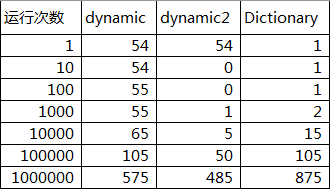C# 比较dynamic和Dictionary性能
作者:网络转载 发布时间:[ 2015/3/12 13:52:52 ] 推荐标签:C# 软件开发 .NET 代码
考虑到传递变参可能出现多个参数,以上测试不完全。
使用以下代码进行第二阶段实验:
public void InvokeDynamic()
{
var e = CallDynamic2(
new { Value1 = 0, Value2 = 0L, Value3 = 0f, Value4 = 0.0, Value5 = "test" });
int v1 = e.Value1;
long v2 = e.Value2;
float v3 = e.Value3;
double v4 = e.Value4;
string v5 = e.Value5;
}
public void InvokeDictionary()
{
var dict = new Dictionary<string, object>();
dict["Value1"] = 0;
dict["Value2"] = 0L;
dict["Value3"] = 0f;
dict["Value4"] = 0.0;
dict["Value5"] = "test";
dict = CallDictionary2(dict);
int v1 = (int)dict["Value1"];
long v2 = (long)dict["Value2"];
float v3 = (float)dict["Value3"];
double v4 = (double)dict["Value4"];
string v5 = (string)dict["Value5"];
}
private dynamic CallDynamic2(dynamic test)
{
int v1 = test.Value1;
long v2 = test.Value2;
float v3 = test.Value3;
double v4 = test.Value4;
string v5 = test.Value5;
v1++;
v2++;
v3++;
v4++;
v5 += "test";
return new { Value1 = v1, Value2 = v2, Value3 = v3, Value4 = v4, Value5 = v5 };
}
private Dictionary<string, object> CallDictionary2(
Dictionary<string, object> test)
{
int v1 = (int)test["Value1"];
long v2 = (long)test["Value2"];
float v3 = (float)test["Value3"];
double v4 = (double)test["Value4"];
string v5 = (string)test["Value5"];
v1++;
v2++;
v3++;
v4++;
v5 += "test";
var dict = new Dictionary<string, object>();
dict["Value1"] = v1;
dict["Value2"] = v2;
dict["Value3"] = v3;
dict["Value4"] = v4;
dict["Value5"] = v5;
return dict;
}
结果数据:

后决定选择使用dynamic
有兄弟考虑可能Box损耗了性能导致Dictionary表现不佳,
专门做了第三阶段实验,对比dynamic和Dictionary<string,long>
具体数据不贴了,结果是dynamic在100000量级快一倍
本文内容不用于商业目的,如涉及知识产权问题,请权利人联系SPASVO小编(021-61079698-8054),我们将立即处理,马上删除。
相关推荐

更新发布
功能测试和接口测试的区别
2023/3/23 14:23:39如何写好测试用例文档
2023/3/22 16:17:39常用的选择回归测试的方式有哪些?
2022/6/14 16:14:27测试流程中需要重点把关几个过程?
2021/10/18 15:37:44性能测试的七种方法
2021/9/17 15:19:29全链路压测优化思路
2021/9/14 15:42:25性能测试流程浅谈
2021/5/28 17:25:47常见的APP性能测试指标
2021/5/8 17:01:11热门文章
常见的移动App Bug??崩溃的测试用例设计如何用Jmeter做压力测试QC使用说明APP压力测试入门教程移动app测试中的主要问题jenkins+testng+ant+webdriver持续集成测试使用JMeter进行HTTP负载测试Selenium 2.0 WebDriver 使用指南














 sales@spasvo.com
sales@spasvo.com